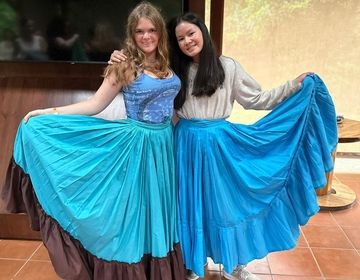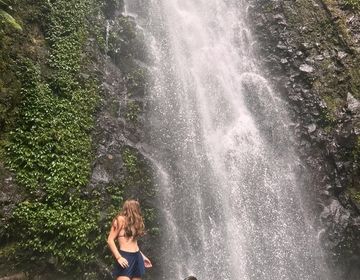In Their Own Words
Earlier today, this PL took to the muddy trails of the CIEE Monteverde Campus to interview the Women in STEM students. We're on a mission to understand, in their own words, events of the past few days. Please enjoy these mini reports, which have been edited for grammar and clarity only.

Zoe asking biologist Paula about being a woman in STEM. (Zoey interviewed is different than Zoe pictured).
Flying High with the Bat Biologists
PL: I'm here with Zoey, and yesterday we had a lovely discussion with two different women in STEM where they were sharing their experiences. Zoey, how did you feel about that discussion?
Zoey: It was really exciting for me. It was very inspiring, and[we talked about] stuff that is always talked about in a [third-person] viewpoint, where it's like, this doesn't actually happen to people [I know], so it was a really good perspective change.
PL: I hear you're looking to be a biologist one day, so how did it feel to talk to some really awesome biologists specifically?
Zoey: I was fan-girling a little bit, with both of them, I was like "Oh my god" they're so cool. It was really exciting.

Emily playing soccer with women in STEM and climate change mitigation students.
Summertime Soccer
PL: Hi, I'm here with Emily asking about the fun day that she had yesterday. The students got a decent amount of free time to do what they chose, Emily what did you choose to do?
Emily: So after Spanish class, we got a bunch of people together and we went to the soccer field and we started a little pick-up game of soccer. A bunch of people hadn't played before, but it was still really fun to pass the ball and try to get a game going.
PL: That sounds lovely.

Maggie playing a game in Spanish class.
Un mundo neuvo, en espan~ol
PL: Hi, I'm here with Ashley and Maggie and we're going to discuss their last day of Spanish, which was yesterday. How did that class go?
Maggie: It was super fun. We started by playing bingo, then we had to create a story [out of cards].
Ashley: And then we had to present the story to the class, and we dressed up -
Maggie: in these really funny costumes! I wore this weird blonde wig and dress. I was the storyteller.
Ashley: And I was the tree in the back.
PL: Did you enjoy your Spanish class? Did you feel like you learned useful things?
Ashley: Yeah, the teacher was really sweet. We learned a lot.
Maggie: Yeah, I loved Elsa [the Spanish teacher]. She was amazing.
Ashley: [The class] forced you to actually speak [Spanish]. She only spoke in Spanish. It was hard to understand [at first], but over time you'd be like -
Maggie: - like, oh I know what she's saying now.
Ashley: Yeah.

Baila and Ava seeing the biodigestor, which takes in pig waste to turn into methane for the kitchen, and water and compost for the fields.

Emily and Zoe in front of the integrated farm map.
Integrated Learning on the Integrated Farm
PL: I'm here with Ava, and this morning we went on an exciting adventure around campus seeing the whole integrated farm. Ava, how was that experience?
Ava: I really loved and enjoyed the experience so much. I thought it was really interesting to learn how the farm was integrated into campus and how everything matters.
PL: That's fantastic. Was there any part of it that you were most intrigued by?
Ava: I thought it was really interesting how the use the methane from the animal [waste] to heat things in the kitchen.

Avery with her newly planted tree!
The Plant Process
PL: I'm here with Avery in the gorgeous sunshine in Monteverde, what have we just finished doing Avery?
Avery: Planting some trees.
PL: And how was that experience?
Avery: It was great. It was really fun. It was cool seeing plants that we normally just walk by being planted and [me] being part of that process.

Nadia and PL Katherine milking one of the cows.
Seattle Needs More Cowbell
PL: Hello avid blog readers, I'm here with Nadia after her first cow milking, where it was reported that she is a true professional, Nadia, how do you feel about that assessment?
Nadia: I feel like I should leave the city to milk the cows. I'll leave my humble abode, Seattle, to come out to Costa Rica and only milk cows for a living, just one udder at a time.
PL: How do you think your family will feel about this?
Nadia: I think they will not believe me if I told them that. [But I] gotta show my fellow city girls that we can milk [cows].

Peyton and Hazel prepping their rice trap contents to be viewed under the microscope.

Fusarium on the rice from the rice traps!
Featured: Fungi
PL: I'm here with Brave and Hazel in the science lab. Can you girls tell me what you've just been doing?
Brave: We were looking at our rice traps, which were basically rice that we put in a cup and buried in different areas of the campus to see the health of the soil. We dug them out and looked at them under the microscope and saw all the different fungi and [bacteria] that have grown. I thought it was really cool seeing everything up close like that.
PL: Awesome. Hazel, can you tell us what kind of things you found and how you were able to tell how the soil was doing?
Hazel: We found lots of different colors of bacteria. We found red/pink Fusarium, which means it's not that healthy. But we also found yellow Beauveria Bassiana and white Bacillus, which means it's good.
PL: That's very interesting. It seems like we have a mix of soil health in this area. Thank you, girls, for doing this hard-hitting investigation.
Related Posts
Global Friendships
The last week on the Monteverde campus has flown by at a rapid pace. However, it seems like ages have passes since the student arrived in the cloud forest. This... keep reading
Folklorico Dance, a core memory made
Student of session 2 shares her experience of her final days in Costa Rica.
Soaring Through the Clouds (Featuring Three Guest Student Writers)
To best sum up our adventurous weekend, we have three guest writers today. Check out what they thought below! Ella Buerkele gives us a beautiful overview of Saturday: On Saturday... keep reading

